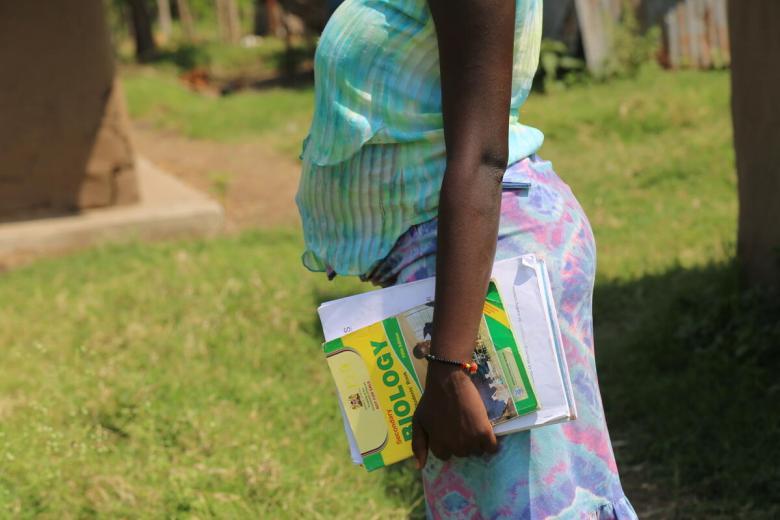Despite the laws, schools adamant to re-admit teenage mothers

In the poverty-stricken village of Ziwa la ngombe in Mombasa County, images of young girls strapping babies on their backs, walking to the next neighborhood in search of casual jobs is nothing unusual.
On a typical day, majority of these young mothers have to wake up so early, prepare themselves and their children, before they set out to walk for kilometers in search of an opportunity that will enable them earn something, as little as just a plate of food or a packet of milk to feed their children. Ideally, these girls should be waking up to go out to school where they would eventually realise their dreams and better their future. But, because of the responsibilities they have as young mothers, their dreams had to be shelved as they took up the motherhood roles.
And while some of them accepted their fate that they won’t be going back to school, for some, the societal attitude towards teenage motherhood is what has blocked their dreams.
Christina Wakilo is one such young mother who despite having a dream of being a teacher in the near future, that remains to be just a dream.
As we catch up with her after landing a one-day cleaning gig in one of the houses in Bamburi, her fears for the future are written allover her face.
Missing menses
In 2022, Wakilo got pregnant shortly after she started a relationship with a man within her neighbourhood. It was her first relationship and so she had no idea of what a relationship demanded from her. At first, she thought she had enough experience having seen her friends being in a relationship. Equipped with such scarcy experience, she thought she ready to handle a relationship.
“I was in form two when I decided to start something with a boy from our neighborhood. All my friends had boyfriends and whenever we walked together, the conversations were mainly on their boyfriends and I mostly felt left out because I was the only who didn’t have someone. The boyfriends would buy them gifts and this made me feel the need to also have a boyfriend,” she says.
And few months into the relationship, she decided to give in to her boyfriend’s request to have sex with him. Afterall, her friends confessed to have had sex with their partners too.
“We had unprotected sex and the man brought me a pill which he said would prevent pregnancy. Unfortunately, a month later, I missed my menstruation and at first, I thought it was a normal delay but then I realised something was amiss after it delayed for three months. And when I raised it with my friends, they urged me to do a pregnancy test which turned out to be positive,” she narrates.
Tensed, confused and afraid, Wakilo went back to her boyfriend and informed him of the new discovery. The man however sent her away and declined to have any involvement with her.
“The man said the pills he had brought me were emergency pills which were suppose to prevent the pregnancy. He accused me of sleeping around with other men, forgetting that he found me as a virgin,” she notes.
Then as months went by, her mother noticed her bulging stomach and loss of appetite, and when she confronted her, Wakilo confessed to be five months pregnant.
This information brought up a fight in their home, which in the process made the neighbours know of her secret. Within a short period, everyone including her schoolmates knew about the pregnancy. She became the topic of discussion at school even among her friends. When her mother confirmed to the teachers of her situation, Wakilo became a point of reference as she was used as an example of bad choices the school going girls should not make.
“When the rumours of my pregnancy reached the principal’s office, they called my mother who confirmed to them that I was indeed pregnant and really begged them not expel me from the school. And even though the school accepted her request, the stigma and discrimination that followed was enough for me to drop out of the school. I was not only abused by fellow students, but also by teachers who would make insulting remarks. Whenever I did a mistake such as getting late to school, the teachers would tell me that I could afford to be late for school but very early to be a mother,” she reveals.
Six months into the pregnancy, even though she wanted to continue with school, she decided to drop out, prepare herself for the arrival of her “bundle of joy”. She lost everything, including friends and her boyfriend and the only person who stood with her was her mother.
“At eight months and two weeks, I gave birth to a baby boy. After some few months, I wanted to go back to school but there were obstacles. I used to ask myself on whether the school would accept me back having castigated me as someone who would influence other girls into having sex. And if they accepted me back, who was to take care of my son, considering that my mother was the sole provider in my family and she needed to work. We could not afford to get someone to look after the baby,” she says.
Denied space
She adds “My mum however decided to get a cheap daycare where we could leave the boy as I went to school. But when she went back to my former school to inquire on whether I could return, the administration said they don’t accept mothers in their school. They instead advised her to go look for a space in other schools. My former school was the closest public school and the next one was many kilometers away.”
With all these predicaments, she resigned to her fate and accepted that her dreams will remain just dreams. And that’s how she started working as a casual labourer where she washes people’s clothes and cleaning their houses.
Alice Mwambira, a teacher at one of the schools in Mombasa concurs with Wakilo’s journey that too often, whenever a school girl gets pregnant, what follows is stigma and discrimination from fellow students as well as teachers and non-teaching staff. Also, too often does that journey brings to an end their journey for a better future.
“For such students, their educational journey is more of shredded, because not so many of them can bare the shame of coming back to class and sitting with other students who know her story. Also, majority of the teachers are not wired to care for pregnant students as we continue to treat them like other students even when we know they need more empathy and attention,” she says.
This then makes it easy for the girls to drop out of school during the pregnancy period, and for those who survive through the period, it becomes difficult for them to come back to the same school.
“Due to the fear of being labelled a mother among young peers and also the fact that fellow pupils know that you have a baby, many young mothers prefer dropping out of school. Also, our schools are not so accommodative and supportive to these young parents, further locking them out of schools,” she adds.
Non-implemented policy
Coincidentally, Mwambira’s sentiments coincides with a recent research conducted by Zizi Afrique Foundation that found that despite there being a Re-entry Policy which was established in 1994, the rate of re-entry is still low and its occasioned by various factors.
According to Dr. Maurice Mutisya from Zizi Afrique Foundation, the study which targeted adolescent mothers’ re-entry to school shows that even though there have been major improvements on teenage mothers going back to school, the achievements are not evenly distributed.
The study which was carried out in Mombasa, Siaya and Samburu shows that one of the major obstacles to teenage mothers’ returning to school after delivery was the lack of awareness of the policy at the community level and especially by the caregivers.
Also, lack of willingness by the schools to implement the policy due to cultural, religious and other factors.
“Majority of the policy implementers assume that its just a government directive and they are not obliged to implementing it. And instead of taking back the girls, most of the schools advise the girls to go to different schools so as to run away from stigma of being a teenage mother. From the research, it’s clear that schools are major gatekeepers of this policy yet education gives them a second chance to realise their dreams,” he says.
Mutisya also says other factors that are an obstacle include unwelcoming school environment for those whose managed to return to school, childcare responsibili











